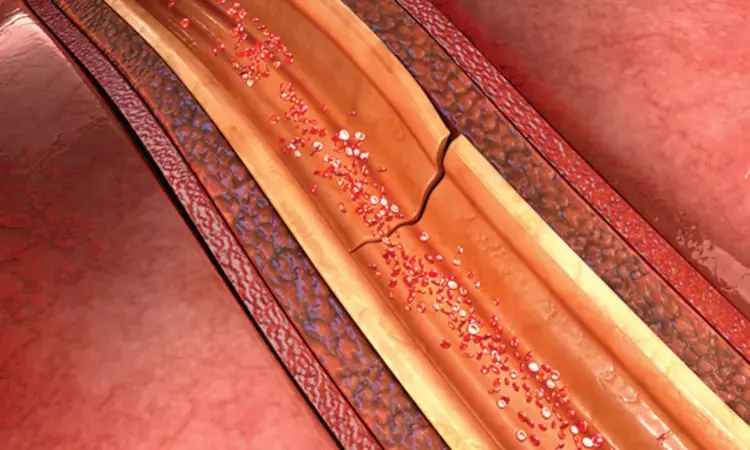- Home
- Medical news & Guidelines
- Anesthesiology
- Cardiology and CTVS
- Critical Care
- Dentistry
- Dermatology
- Diabetes and Endocrinology
- ENT
- Gastroenterology
- Medicine
- Nephrology
- Neurology
- Obstretics-Gynaecology
- Oncology
- Ophthalmology
- Orthopaedics
- Pediatrics-Neonatology
- Psychiatry
- Pulmonology
- Radiology
- Surgery
- Urology
- Laboratory Medicine
- Diet
- Nursing
- Paramedical
- Physiotherapy
- Health news
- Fact Check
- Bone Health Fact Check
- Brain Health Fact Check
- Cancer Related Fact Check
- Child Care Fact Check
- Dental and oral health fact check
- Diabetes and metabolic health fact check
- Diet and Nutrition Fact Check
- Eye and ENT Care Fact Check
- Fitness fact check
- Gut health fact check
- Heart health fact check
- Kidney health fact check
- Medical education fact check
- Men's health fact check
- Respiratory fact check
- Skin and hair care fact check
- Vaccine and Immunization fact check
- Women's health fact check
- AYUSH
- State News
- Andaman and Nicobar Islands
- Andhra Pradesh
- Arunachal Pradesh
- Assam
- Bihar
- Chandigarh
- Chattisgarh
- Dadra and Nagar Haveli
- Daman and Diu
- Delhi
- Goa
- Gujarat
- Haryana
- Himachal Pradesh
- Jammu & Kashmir
- Jharkhand
- Karnataka
- Kerala
- Ladakh
- Lakshadweep
- Madhya Pradesh
- Maharashtra
- Manipur
- Meghalaya
- Mizoram
- Nagaland
- Odisha
- Puducherry
- Punjab
- Rajasthan
- Sikkim
- Tamil Nadu
- Telangana
- Tripura
- Uttar Pradesh
- Uttrakhand
- West Bengal
- Medical Education
- Industry
High SCAD polygenic risk score strongly associates with familial SCAD risk

Australia: A study of common polygenic risk for spontaneous coronary artery dissection (SCAD) in a cohort of families and individuals with sporadic SCAD revealed that a high SCAD polygenic risk score (PRS) was associated with increased risk of SCAD and contributed to disease patterns within pedigrees.
In contrast, no rare variants in genes previously implicated in SCAD were identified as a likely cause in any family. The findings published in JAMA Cardiology support the hypothesis that common polygenic variants contribute to the familial clustering of SCAD cases, potentially more so than rare variants of large effect size.
"The genetic association study comprising 13 families with SCAD, 173 individuals with sporadic SCAD, and 1127 controls revealed that a polygenic risk score for SCAD was associated with significantly higher odds of disease in both familial and sporadic SCAD compared with healthy controls," the researchers reported.
Common genetic variants play a critical role in all forms of SCAD, can potentially explain familial clustering, and further stress the complex genetic aetiology of the disease, the study stated.
Spontaneous coronary artery dissection is a poorly understood cause of acute coronary syndrome (ACS) that predominantly affects women. To date, evidence indicates a complex genetic architecture, while a family history is reported for a minority of cases. Therefore, Ingrid Tarr, Victor Chang Cardiac Research Institute, Darlinghurst, Australia, and colleagues aimed to determine the contribution of rare and common genetic variants to SCAD risk in familial cases, the latter via the comparison of a polygenic risk score with those with sporadic SCAD and healthy controls.
The study analyzed families with SCAD, individuals with sporadic SCAD, and healthy controls. For all participants, genotyping was undertaken. Participants' recruitment was done between 2017 and 2021. A polygenic risk score for SCAD was calculated for all participants. The presence of rare variants in genes associated with connective tissue disorders (CTD) was also evaluated. Recruitment of individuals with SCAD was done via social media or from a single medical centre. The study used a previously published control database of healthy elderly individuals.
PRS for SCAD comprised of 7 single-nucleotide variants. The study's main outcomes were disease status (sporadic SCAD, familial SCAD, or healthy control) associated with PRS.
The study included 13 families with SCAD (27 affected and 12 unaffected individuals), 173 individuals with sporadic SCAD, and 1127 healthy controls. A total of 188 individuals with SCAD were female, including 25 of 27 with familial SCAD and 163 of 173 with sporadic SCAD; of 12 unaffected individuals from families with SCAD, 6 were female; and of 1127 healthy controls, 672 were female.
The study revealed the following findings:
- Compared with healthy controls, the odds of being an affected family member or having sporadic SCAD were significantly associated with a SCAD PRS (where the odds ratio [OR] represents an increase in odds per 1-SD increase in PRS) (affected family member: OR, 2.14; sporadic SCAD: OR, 1.63). This association was not seen for unaffected family members (OR, 1.03) compared with controls.
- Those with familial SCAD were overrepresented in the top quintile of the control PRS distribution (OR, 3.70); those with sporadic SCAD showed a similar pattern (OR, 2.51).
- Affected individuals within a family did not share any rare deleterious variants in CTD-associated genes.
"The findings showed a significant role of extreme aggregation of common genetic risk in familial clustering of SCAD as well as in sporadic case predisposition, although further study is required," the researchers wrote.
Reference:
Tarr I, Hesselson S, Troup M, et al. Polygenic Risk in Families With Spontaneous Coronary Artery Dissection. JAMA Cardiol. Published online January 24, 2024. doi:10.1001/jamacardio.2023.5194
Dr Kamal Kant Kohli-MBBS, DTCD- a chest specialist with more than 30 years of practice and a flair for writing clinical articles, Dr Kamal Kant Kohli joined Medical Dialogues as a Chief Editor of Medical News. Besides writing articles, as an editor, he proofreads and verifies all the medical content published on Medical Dialogues including those coming from journals, studies,medical conferences,guidelines etc. Email: drkohli@medicaldialogues.in. Contact no. 011-43720751


